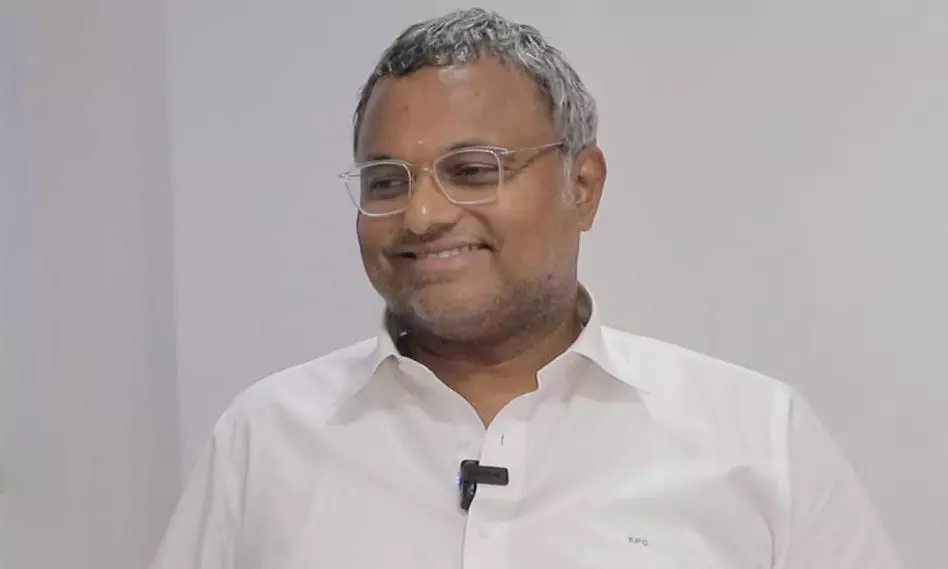
‘Keeladi a blow to BJP narrative’: Karti Chidambaram on history, politics, urban India
Sivaganga MP says Keeladi findings challenge BJP’s religious history claims, calls for Indian politicians to focus on real-life issues and shed “emotive politics”

Keeladi’s archaeological revelations have shaken up dominant historical narratives. But for Sivaganga MP Karti Chidambaram, the story is not just about ancient Tamil civilization—it’s also about how the urban middle class is ignored, taxes go unrewarded, and regulators lag behind in a digital economy.
In this interview, he shares his candid views on archaeology, taxation, SEBI lapses, and India’s need to re-centre the conversation around everyday urban struggles.
You’ve spoken often about Sivaganga’s cultural heritage. How has the Keeladi excavation impacted the region—and do you see political resistance to what it reveals?
Keeladi has definitely given a huge boost to Sivaganga. Earlier, visitors came mainly for the temple circuit. Now, with Keeladi, more people are arriving, and the government has done well to set up good infrastructure and showcase the excavation site. It’s been a real positive for our district.
Also read: After Keeladi, why Tamil Nadu wants to excavate Nagapattinam site
But the attitude of the central government—especially the Archaeological Survey of India—has been deeply disappointing. I believe they find it hard to accept that a vibrant and advanced civilization existed here without any organized religion. That absence of structured worship at Keeladi challenges the narrative they promote, which is rooted in a religious identity.
This empirical evidence of a flourishing, secular civilization clashes with their version of history. That’s why they’ve been reluctant to endorse the Keeladi findings and have created unnecessary roadblocks. But for Tamil Nadu—and especially for Sivaganga—Keeladi is a matter of pride.
You recently tweeted about the need for political parties to focus on urban governance. What did you mean by that? And how does this square with parties like the Congress still engaging with emotional issues like caste, language, and religion?
I’m not trying to start a new political party. What I’m saying is that urban lower-middle and middle-class citizens are the most neglected demographic in India today. No one is talking about ease of living for them.
Think about someone earning Rs 25,000–30,000 a month in a city. How do they afford rent? How do they commute? Where do they eat? What public conveniences do they use? How do they afford to send their children to school or pay for medical care?
Political parties need to start focusing on these daily, tangible concerns. There’s a serious gap in addressing the urban reality.
Also read: Keeladi excavation fuels India’s ancient civilization origin debate
On that note, direct taxes often cause frustration among citizens. Some even describe it as a kind of ‘tax terrorism’. What’s your view on how the government is handling taxation?
People are upset about taxes because they’re not getting any return on them. In some countries, tax rates are even higher—but citizens see the benefit in good roads, consistent electricity, clean drinking water, quality healthcare, and education.
In India, people feel short-changed. They pay taxes but don’t get services. That’s a governance failure—not just by the central government, but across the board. Anyone paying tax in this country feels like they aren’t getting value for money.
What about issues of governance in financial markets? For instance, SEBI delayed action despite early warnings in cases like the Jane Street manipulation. How do you view this regulatory lag?
Market manipulation is always going to happen. It’s inevitable. What matters is whether the regulator can stay one step ahead.
Regulators need systems that can detect these manipulations—especially now, when technology allows for more sophisticated ways to game the market. These systems must be robust enough to not only catch offenders but penalize them effectively.
Also read: Keeladi, Indus Valley sites show no evidence of organised religion: Indologist R Balakrishnan
You’ve called for public discourse to return to more grounded issues. What do you think is missing from our political debate?
The conversation needs to come back to the problems of the average citizen. We focus too much on high-level political drama or emotional, divisive issues. Meanwhile, the real, everyday struggles—especially of the urban middle class—are ignored.
That’s the space we’re missing in Indian politics today.
(The content above has been generated using a fine-tuned AI model. To ensure accuracy, quality, and editorial integrity, we employ a Human-In-The-Loop (HITL) process. While AI assists in creating the initial draft, our experienced editorial team carefully reviews, edits, and refines the content before publication. At The Federal, we combine the efficiency of AI with the expertise of human editors to deliver reliable and insightful journalism.)

